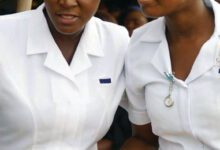Mpilo nurses tested positive for covid 19

Thirty-two nurses at Mpilo Central Hospital in Bulawayo has tested positive for COVID 19, authorities to outsource personnel to cover the gap as some health workers are on strike.
Those who tested positive are all from the opportunistic infections (OI) department within the hospital and the development comes amid a nationwide nurses’ strike which enters day 38 today.
Mpilo is the only operational referral hospital for the southern region at the moment after a decision was made to set aside United Bulawayo Hospitals (UBH) for Covid-19 patients, pending completion of renovations at designated health centers; Ekusileni Medical Centre, Thorn grove Infectious Diseases Hospital and Old Bartley Memorial Block (BMB) within UBH.
Last month, four nurses tested positive at Mpilo a situation which left 197 of their colleagues quarantined.
Health workers have been greatly exposed to Covid-19 and 115 had been infected by last Friday in Bulawayo alone, with over 300 having been infected countrywide.
The additional 32 nurses from Mpilo tested positive on Saturday.
They all have been isolated and are awaiting follow up visits from the department of health services.
Acting Mpilo chief executive officer Professor Solwayo Ngwenya said he was working with health partners to outsource more nurses due to the strike and the latest nurses Covid-19 positive cases.
He said 18 other nurses who were isolated last month after testing positive were back at work but the national strike is affecting service delivery.
“We are shocked to discover that an additional 32 of our health care workers were recently infected and tested positive to Covid-19 on Saturday. The department involved will rather not close because it will put thousands and thousands at risk if they do not get care.
“The nurses are now in isolation and we are working on disinfecting the area and outsource nurses with the help of our partners to help fill the gap until these ones recover,” said Prof Ngwenya.
He said Mpilo officials are working tirelessly to keep the department running so that thousands have access to health care.
Prof Ngwenya said the virus is spreading like a raging fire and everyone is potentially a COVID-19 carrier; hence people must comply with lockdown measures.
He said the new World Health Organisation guidelines allow nurses to return to work after 10 days of self-isolation.
“The guidelines state that after 10 days of isolation the person is no longer infectious and can safely return to work. This is quite a sensible guideline because if we were too strict in our scenario, we would close down,” said Prof Ngwenya.
Asked why nurses are continuing to test positive in large numbers, he said people should understand that Covid-19 is in the community and is not only found in hospitals.
“Nurses come from all over Bulawayo and they use the same public transport and supermarkets used by members of the public. Everyone is exposed to COVID and it is not like they got it from the hospital because it’s also there in the community.
“Nurses also live in the community and we should get that right as there is no point in believing that Covid-19 is only found in hospitals.
“It is only that those nurses were tested at one go and found to be positive. My reminder is that COVID is everywhere and nearer to all of us than we think it is,” he added.
Prof Ngwenya said members of the public should change behaviors when using public transport or when in public spaces.
Zimbabwe Nurses Association president Mr. Enock Dongo said it was worrying to note that nurses constitute the highest number of Covid-19 confirmed cases in Zimbabwe.
He said more than 300 nurses have been infected while saving lives as front liners.
Mr. Dongo said the situation will only improve when nurses have access to personal protective equipment (PPE).
“It is scary to note that health care workers continue risking their lives while working without adequate PPE. For example, a few days ago at Parirenyatwa Hospital in Harare, 60 Covid-19 patients were admitted and a few days later 70 nurses tested positive,” he said.
“There must be adequate PPE to protect nurses and all health workers so that they do not, in turn, spread the disease to members of the public who will be seeking care.” The Chronicle

























